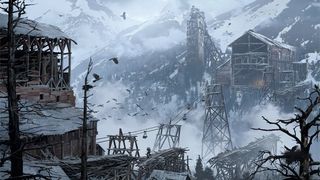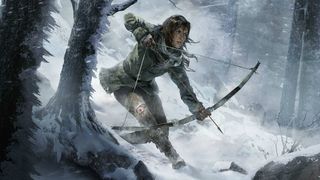Five days of exclusive access to Rise of the Tomb Raider: Day five
For a game called Tomb Raider, tombs were conspicuously absent. Instead of the ancient machinery of old, we found self-contained puzzle chambers filled with modern-day contraptions. Tombs are largely absent from our Rise of the Tomb Raider presentation, too – “they are too big to dip a toe into”, we’re told – though they aren’t far from Hughes’ mind.
Although enthusiastic about all his new ideas, it’s the promised return of true raiding that lights the fire in his eyes; an excitement backed up by a showreel of deathtraps to come. We catch glimpses of catacombs sprawling over multiple floors. A waterlogged shrine with lakes of shimmering green murk that will no doubt test Lara’s diving ability. There’s an intriguing Hellenic-looking number, with verdant greenery hanging from majestic pillars. None of this, it should be noted, looks native to Siberia. Although this has been announced as a globetrotting adventure, Hughes is keen to “eke out the variety from any given space”, even if there’s “a little bit of creative liberty.”

A shot of grand doors carved into Petra-esque rock suggests Lara better pack sun lotion. Crystal Dynamics has a proven eye for tomb architecture, having given us the excellent Legend, Anniversary and Underworld before rebooting the series. Underworld, in particular, gave us a huge leap in sophistication fuelled by a new console generation. Think of a ziggurat jutting from the vast seabed or a shrine so large it had to be tackled on motorbike, and Tomb Raider’s modest crate-pushing cubbyholes look no more epic than a trip to your garage.
ROTTR arrives after a second technical leap, so surely we should be expecting some pretty spectacular evolution? “I think one [development] is scale, and pushing scale in general. There is a sense that my most memorable tomb experiences are these giant places that feel almost unsolvable from a gamer’s perspective. And I think that’s something we’re able to push from a technology perspective,” says Hughes. But don’t assume the line is drawn at ‘bigger is better’. “Often it’s the immersion and storytelling that really add that other important layer. You got a glimpse of it in the teaser, but the idea is that through lighting and a more dynamic effects system, there’s a lot more personality in every space.”

And it’s not as if Lara’s world is neatly split into tombs and survival-focused wilderness. Threats from one can bleed into the other. “There are animal guardians that are just guarding their territory but are ultimately barriers to discovering these ancient spaces,” explains Hughes. Factor in that aforementioned desire to see Lara die as much from challenging traversal as lead-absorption and you get an exciting sense that tombs are back with a vengeance. Careful as he is not to spill any exact details, Hughes is willing to be drawn on his more general tomb-building philosophy.
The first key ingredient? “I think it starts with the awe-inspiring ancient spaces and that sense of discovery when you walk into them. For me, coming into them – we talk about the giant door or something that basically presents you with a problem to solve – needs a balance between enough grounding and believability that it feels real, but a degree of grandeur and almost improbable scale and ambition that for a moment you really are in awe of what people built once upon a time.” So: enter and drool. What next? “Going to the next level, it really is about solving puzzles and getting a degree of scale. We use the term ‘nested puzzles’, and part of that means having more than a single thing in a room, so as we make these rooms bigger you create this situation of, ‘Oh, I need to get up there to do that thing and then I need to get over here’.”

That it’s tricky to pick exact details from the showreel is due to many points of interest battling for attention amid the renewed scale and verticality. The final step is taking such a promising space and lacing it with your deadliest ideas. “The tomb weaves together all of the game’s pillars. As much as they’re an almost set-piece moment for our puzzle designers, you’re also having to do some of your craziest traversal to navigate these tombs. And you’re avoiding traps and, in some cases, fighting animals,” says Hughes.
Sign up to the GamesRadar+ Newsletter
Weekly digests, tales from the communities you love, and more
It makes perfect sense that a game called Rise of the Tomb Raider would see its ideas converge and amplify in those titular constructs. It’s a pretty ambitious promise, sure, but as Amelia Earhart said, “Never do things others can or will do if there are things that others cannot do or will not do”. Words for adventurers, and studios, to live by.
Matthew Castle is the former editor of Official Nintendo Magazine and Official Xbox Magazine. He was also part of the team on the Nintendo Gamer magazine back in the day. Since then, he's worked at Rock, Paper, Shotgun as part of their video team, as well as for the official Xbox On YouTube channel. Nowadays, he's a freelance games critic and consultant, and one half of the Back Page podcast.

Diablo 4 dev is sending 666 buckets of literal bugs to "meat their maker" at a charity for hungry birds

The cult vampire third-person shooter that nearly bankrupted the small studio that made it is getting a film adaptation from the Transformers producer

Fallout mod site says it's like players are downloading Skyrim "twice every second" after Amazon TV series drives fans back to the open-world RPGs
Most Popular





